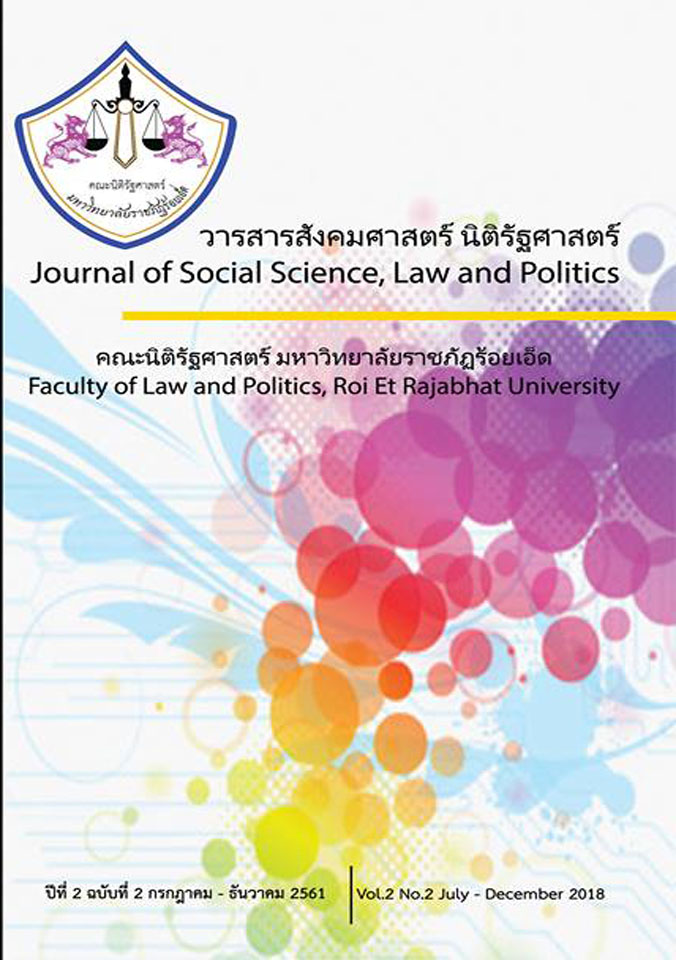The Student Council and the Role of Strengthening Democracy in the School
Keywords:
Student Council, Democracy in the SchoolAbstract
The objectives of this research are to examine the process of democracy promotion in schools by means of student council activities and to propose an approach of student council that suits the context of Thailand. This research is a qualitative research and quantitative approach to collect data. For data collection in Japan were used interview method primarily with school administrator and students from Inagakuen (secondary public school) and Waseda (secondary private school) , for Thailand, expert interviews were conducted before undertaking field research to interview advisors of student council activities and students who take part or used to take part in a student council and those who never take part in a student council in four schools whose student councils have been recognized as best practices in Thailand. Using questionnaires as research tools, a survey sample of 382 respondents, selected by a purposive sampling, were asked to answer questions concerning the implementation of their student councils and democratic values in their own views. Qualitative data analysis utilized document analysis and analytic induction methods. For quantitative research, the calculation of descriptive statistics, including frequency, percentage, mean, and standard deviation (SD), was conducted using statistical computational tools.
The findings indicated that key elements to a successful democracy in Japan are the well-defined educational goal and the common ground shared by the schools and the central government toward the educational management approach. The concept of learning about democracy through practice is a crucial principle in carrying out student council activities. Student council activities are employed as a means to develop and cultivate a sense of responsibility in a student’s way of life and to underline the concept of active participation. The student councils in Thailand and those in Japan are not much different in terms of their principle, concept and forms. The main factors which determine different results in adopting a student council as a means to promote democracy in the two countries, however, lie on the well-defined educational goal, the firm educational policy, as well as the development of basic skills for teachers.
Quantitative analysis shows that activity in which students can perform by themselves or are free to perform the most is “the distribution of roles and responsibilities within the students” (59.7 percent), the most recognized student council mission is the mission to perform in compliance with the school regulations or any other government regulations as well as to preserve the culture and traditions of moral good. The result of democratic value survey indicated that the average of all aspects of democratic values fall within the stage of "Responding" ( = 2.48, SD = .35). The value aspect of justice and wisdom has the highest average score which falls within the stage of "Recognizing" (
= 2.54, SD = .42). The average scores of current student council members are higher than those of former student council members in all aspects of democratic values. In comparison with the current and former student council members, the students who never take part in a student council have the lowest average score in all aspects of democratic values. The keys to strengthening the democratic process in school using student councils include determining of direction and framework to enable the continuity of student council activities, making student council activities as equally important as other extra-curricular activities, improving the quality of student council activities’ advisors, allocating sufficient funds to support student council activities, providing accurate information about the democratic process, as well as raising awareness among administrators and teachers of the importance of student council activities as a means to drive the democratic participation in schools.
References
กระทรวงศึกษาธิการ. (2557). ประกาศกระทรวงศึกษาธิการ เรื่อง การเพิ่มวิชาหน้าที่พลเมืองเป็นรายวิชาเพิ่มเติมในหลักสูตรแกนกลางการศึกษาขั้นพื้นฐาน พุทธศักราช 2551. สืบค้นจาก http://www.spm38.go.th/home/attachments/article/1052/1.pdf
ขจรศักดิ์ บัวระพันธ์. (2557). วิจัยเชิงคุณภาพไม่ยากอย่างที่คิด (พิมพ์ครั้งที่ 6). สถาบันนวัตกรรมการเรียนรู้ มหาวิทยาลัยมหิดล.
คณะกรรมการร่างรัฐธรรมนูญ. (2559). ร่างรัฐธรรมนูญแห่งราชอาณาจักรไทย พุทธศักราช ....(แก้ไขตามคำวินิจฉัยศาลรัฐธรรมนูญ). สืบค้นจาก http://cdc.parliament.go.th/draftconstitution2/ewt_dl_link.php?nid=803&filename=index
ชัยอนันต์ สมุทวณิช. (2553). การสร้างพลเมืองในสังคมประชาธิปไตย. คอลัมน์ “ชีวิตที่ เลือกได้” ในมติชนออนไลน์ สืบค้นจาก http://www2.manager.co.th/Daily/ViewNews.aspx?NewsID=9530000178133
เพ็ญนภา พุ่มหมี. (2550). การศึกษาความสัมพันธ์ระหว่างปัจจัยบางประการกับค่านิยมประชาธิปไตยของนักเรียนชั้นมัธยมศึกษาปีที่ 3 โรงเรียนสังกัด กรุงเทพมหานคร. ปริญญามหาบัณฑิต สาขาวิชาการวิจัยและสถิตทางการศึกษา มหาวิทยาลัยศรีนครินทรวิโรฒ.
ประกอบ สาระวรรณ. (2548). การนำเสนอรูปแบบสภานักเรียนในสถานศึกษาขั้นพื้นฐาน. วิทยานิพนธ์การศึกษาดุษฎีบัณฑิต สาขาการบริหารการศึกษา มหาวิทยาลัยนเรศวร.
ปริญญา เทวานฤมิตรกุล. (2555). การศึกษาเพื่อสร้างพลเมือง (Civic education). กรุงเทพมหานคร: นานมีบุ๊คส์พับบลิเคชั่นส์.
รสสุคนธ์ มกรมณี. (2556). พฤติกรรมความเป็นพลเมืองของเยาวชนในมหาวิทยาลัยราชภัฏสวนสุนันทา. วารสารวิจัยและพัฒนา มหาวิทยาลัยราชภัฏสวนสุนันทา. (5). 74-84.
รัตนะ บัวสนธ์. (2556). วิจัยเชิงคุณภาพทางการศึกษา (พิมพ์ครั้งที่ 4). กรุงเทพมหานคร: สำนักพิมพ์แห่งจุฬาลงกรณ์มหาวิทยาลัย.
วรากรณ์ สามโกเศศ. (2554). การศึกษาเพื่อสร้างความเป็นพลเมือง. สืบค้นจาก http://www.varakorn.com/upload/page/matichon_daily/3_mar_1 1_daily.pdf
สถาบันพระปกเกล้า. (2550). การสำรวจค่านิยมประชาธิปไตยและค่านิยมของเยาวชน. สืบค้นจาก http://kpi.ac.th/media/pdf/M8_83.pdf
สุภางค์ จันทวานิช. (2542). วิธีการวิจัยเชิงคุณภาพ. กรุงเทพมหานคร: โรงพิมพ์แห่ง จุฬาลงกรณ์มหาวิทยาลัย.
สำนักงานคณะกรรมการการศึกษาขั้นพื้นฐาน. (2554). การส่งเสริมวิถีประชาธิปไตยผ่านกิจกรรมค่าย.สืบค้นจาก http://social.obec.go.th/library/document/democracy/democracy-camp.pdf
สำนักงานคณะกรรมการการศึกษาขั้นพื้นฐาน. (2557). แนวทางการจัดการเรียนรู้รายวิชาเพิ่มเติม หน้าที่พลเมือ. สืบค้นจาก http://www. cvk.ac.th/download/Civil-final.pdf
สำนักงานคณะกรรมการการศึกษาขั้นพื้นฐาน ก. (2558). คู่มือการจัดกิจกรรมฝึกอบรมสภานักเรียน. กรุงเทพมหานคร: โรงพิมพ์สำนักงานพระพุทธศาสนาแห่งชาติ.
สำนักงานคณะกรรมการการศึกษาขั้นพื้นฐาน ข. (2558). หลักการและแนวทางในการดำเนินงานสภานักเรียน. กรุงเทพมหานคร: โรงพิมพ์สำนักงานพระพุทธศาสนาแห่งชาติ.
สำนักงานคณะกรรมการการศึกษาขั้นพื้นฐาน ค. (2558). คู่มือแนวทางการปฏิบัติงาน กิจกรรมสภานักเรียน. กรุงเทพมหานคร: โรงพิมพ์สำนักงานพระพุทธศาสนาแห่งชาติ.
อรวรรณ พนาพันธ์. (2518). การจัดสภานักเรียนในโรงเรียนมัธยมศึกษา. วิทยานิพนธ์ ครุศาสตร มหาบัณฑิต แผนกวิชามัธยมศึกษา บัณฑิตวิทยาลัย จุฬาลงกรณ์มหาวิทยาลัย.
Campbell, D.F. J., Pölzlbauer, P., Barth, T. D. and Pölzlbauer, G. (2013). Democracy Ranking 2013 (Scores). Vienna: Democracy Ranking.
Davies, I., Mizuyama, M. and Thompson, G.H. (2010). Citizenship Education in Japan. Citizenship, Social and Economic Education, 9(3), 170-178.
Griebler, U. and Nowak, P. (2012). Student councils: a tool for health promoting schools? Characteristics and effects. Health Education. 112(2). 105-132.
McFarland, D. and Starmanns, C.E. (2009). Inside Student Government: The Variable Quality of High School Student Councils. Teachers College Record. The Voice of Scholarship in Education.
Parmenter, L., Mizuyama, M. and Taniguchi, K. (2008). Chapter 15: Citizenship Education in Japan. The SAGE Handbook of Education for Citizenship and Democracy. SAGE Publications.
Downloads
Published
How to Cite
Issue
Section
License
บทความที่ได้รับการตีพิมพ์เป็นลิขสิทธิ์ของวารสารสังคมศาสตร์ นิติรัฐศาสตร์ มหาวิทยาลัยราชภัฎร้อยเอ็ด
ความคิดเห็นในบทความและงานเขียน ซึ่งตีพิมพ์ในวารสารฉบับนี้ เป็นความคิดเห็นส่วนบุคคลของผู้ประพันธ์โดยอิสระ กองบรรณาธิการ วารสารสังคมศาสตร์ นิติรัฐศาสตร์ไม่จำเป็นต้องเห็นด้วยเสมอไป หากท่านประสงค์จะนำบทความหรืองานเขียนเล่มนี้ไปตีพิมพ์เผยแพร่ จะต้องได้รับอนุญาตจากผู้ประพันธ์ตามกฎหมายว่าด้วยลิขสิทธิ์




